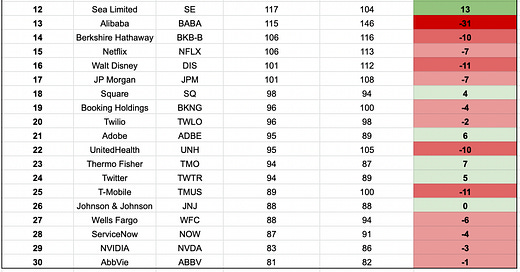Today’s Newsletter is Proudly Sponsored By Wynter
Want to give back to the finance community while earning extra revenue?
Join Wynter's research panel. Take industry surveys, be compensated every time you do it. Learn what businesses that try to sell to you are testing. Influence their messaging with your feedback.
A test takes 10-15 minutes. Super low-key time commitment.
Today, I analyse the most popular stocks owned by hedge funds as of Q3 2021. I will briefly explain why this might be valuable and then what we can ascertain from the latest available data.
Before we start, I would really appreciate if you could complete the below subscriber survey which will only takes a couple of minutes. I have some big things planned for 2022 and your feedback greatly helps to ensure that this newsletter provides the most valued content possible. Whether you are a new subscriber or if you been following from the early days, this is the opportunity to have your say in a fully anonymous way.
As you are probably aware, this weeks newsletter is coming a day earlier than usual as tomorrow is Christmas Eve. I would like to take this opportunity to wish you and your family a very safe and merry Christmas.
Why Institutional Ownership is Important
It takes a significant amount of demand to move a share price up or down. Retail investors like you and I are unlikely to be able to do this (unless we all jump on Reddit and start pumping GameStop). The largest source of demand for stocks comes from institutional investors. William O'Neil, author of How to Make Money in Stocks, suggests that if a stock has no institutional owners, it's because they have already seen it and rejected it. O'Neil has institutional sponsorship as the sixth characteristic to look for in stocks worth buying. Institutions can occupy a large percentage of the float and power stock moves over the long term.
Hedge Fund Hierarchy

Microsoft overtook Amazon and Facebook to become the most popular stock owned by hedge funds. An extra twelve funds held Microsoft at Q3 compared to Q2.
Other stocks that proved popular during the quarter were Salesforce and Sea Limited with net increases of 11 and 13 respectively.
Three stocks were sold hand over fist by hedge funds namely Alibaba, Amazon and PayPal. Alibaba experienced the largest negative variance with 21% of hedge funds that owned the stock at Q2 selling in Q3. Amazon suffered a net decrease of 29 and slipped from first to third in the overall rankings. PayPal saw a net decreases of 20.
Ownership and Stock Price Correlation
Next, I’ve analysed the stock price movements during the quarter for the top five stocks that funds accumulated and dissipated.
It is interesting to observe the fund ownership movement mirror the stock price movement in the majority of cases. Sea Limited which hedge funds increased exposure the most had the largest stock price increase. Alibaba which hedge funds decreased exposure the most had the largest stock price decrease.
Two outliers stand out in the data. Uber had a net gain of eight funds but the stock decreased 11%. Apple had a net loss of eighteen funds but the stock increased 3%.
There are a whole host of reasons why this does not correlate in all instances. Firstly, there are a lot of other institutional investors outside of hedge funds including mutual funds, pension funds, insurance companies and banks. Additionally, the timing of the hedge fund buy or sell at the start or end of the monthly would impact the result given the stock price movement is for the entire period.
Conclusion
Institutional investors are often referred to as ‘the smart money’ and institutional ownership can be a good thing or a bad thing, depending on which way the pendulum swings. These big institutions move in and out of positions in large blocks so they cannot buy or sell without leaving their fingerprints everywhere. As we can see with Alibaba this quarter, if something goes wrong and the big owners sell in their droves, the stock’s value will plunge.
Institutional ownership is another data point that we can utilize in our due diligence process. Like anything, it is not advisable to make an investment based on institutional ownership information taken in isolation.
Anyone that listens to the Stock Club Podcast by MyWallSt might have heard the guys reference some of my work on the most recent episode. In particular, the analysts were answering a listeners question related to ‘picks and shovels’ around NFTs. The tweet below was referenced on the podcast for anyone that might have missed it.


Contact me
Twitter: @wolfofharcourt
Email: wolfofharcourtstreet@gmail.com
Hit the subscribe button below if you have not already done so in order to receive the latest content straight to your inbox each week.
All previous posts are viewable on the website.
If you enjoy what you see, please give it a like, comment below and share.
Happy investing
Wolf of Harcourt Street
Disclaimer: I am not a financial adviser and I am not here to give specific financial advice. The opinions expressed are for general informational purposes only and are not intended to provide specific advice or recommendations for any individual or on any specific security or investment product. The information is based on personal opinion and experience, it should not be considered professional financial investment advice. There is no substitute for doing your own due diligence and building your own conviction when it comes to investing.





